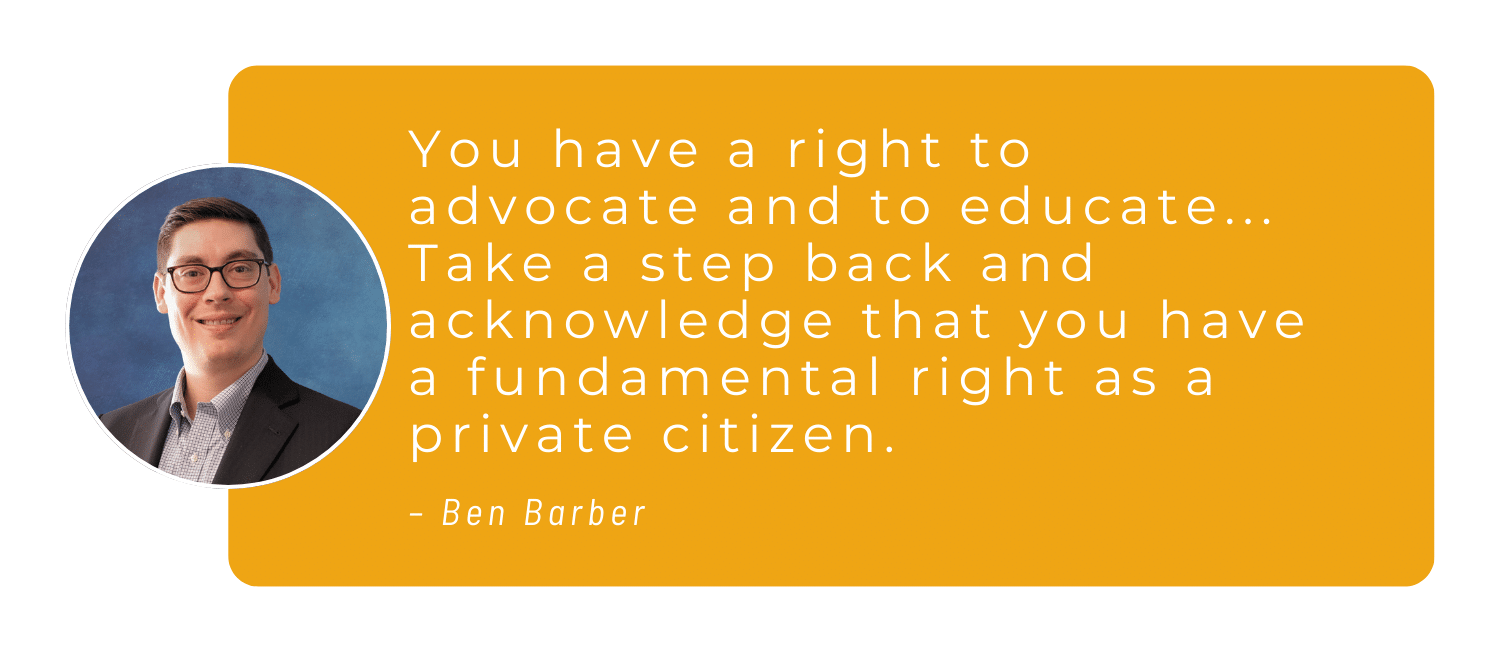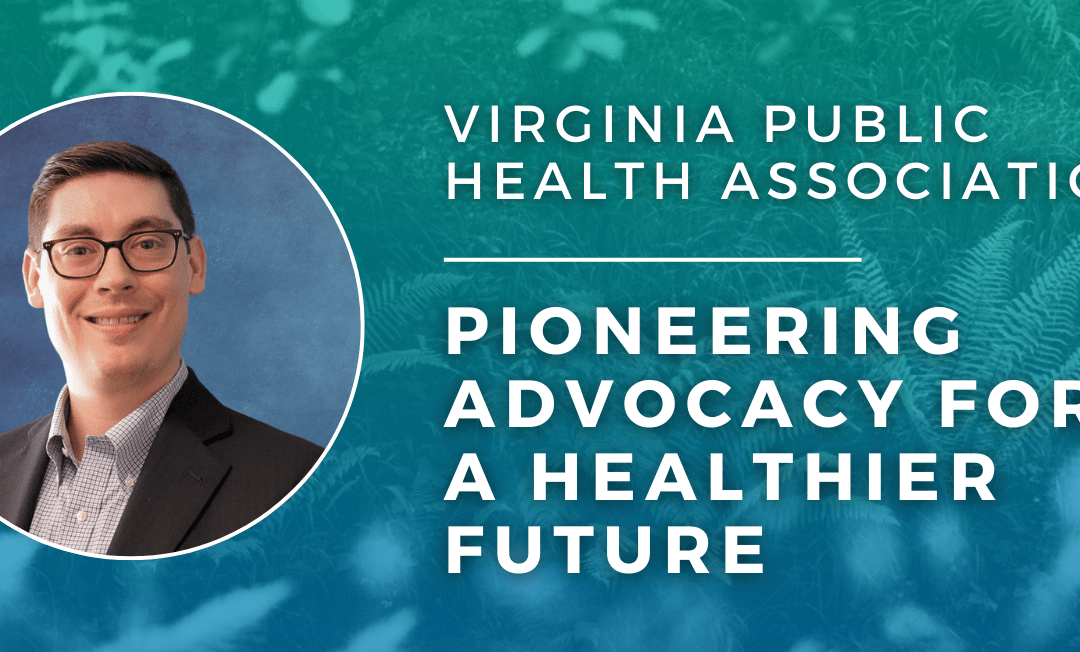In the changing world of public health, the Virginia Public Health Association stands out for making progress and working together to advocate for its people’s health. A recent conversation with VPHA’s president, Ben Barber, shed light on the organization’s accomplishments, challenges, and the values guiding their efforts. Ben, with his extensive background in health policy analysis and strategic initiatives, brings invaluable expertise to the table. His roles as policy director at Virginia Health Catalyst and president of VPHA show his strong dedication to shaping policies that improve Virginians’ health. Ben’s work connects research, policy and action, promoting strategies backed by evidence to tackle the state’s biggest health issues.
VPHA’s journey into policy and advocacy began in 2021, when its Policy and Advocacy Committee was formed. This “small but mighty group,” as Ben puts it, met consistently over the years, actively engaging in both state legislative advocacy and broader policy work, influencing the direction of public health in Virginia. With a focus on cross-cutting issues, the association has strategically directed its efforts towards three pillars — strengthening workforce, funding and authority, which are crucial for successful public health initiatives. While Virginia has many organizations advocating for specific health issues, VPHA aims to focus on a broader picture and advocate for issues that impact everyone’s health. The organization prioritizes collaboration over becoming experts on specific policy issues. They focus on broader issues while building partnerships and coalitions to support legislative advocacy for other public health related bills. VPHA’s strength is in relying on experts and organizations, filling in gaps and bringing together different stakeholders to create a strong advocacy network.
VPHA achieved a major milestone working to revamp local health districts (LHDs), many of which faced challenges due to a lack of full-time directors. Through advocacy efforts and having strong individual leaders like Dr. Leslie Hoglund, a clinical assistant professor at Old Dominion University School of Community and Environmental Health, VPHA successfully pushed for a change in the law in 2022. As Ben acknowledges, “most policy work is implementation,” emphasizing the importance of staying committed to turning legislative wins into real-world outcomes. They achieved a significant change by consistently advocating for necessary support. This change allowed qualified professionals, not just physicians, to lead LHDs. Their approach focused on promoting a broader understanding of the need for qualified professionals in leadership roles within LHDs and highlighting the collective effort needed to manage this significant change. Today, at least four LHDs are led by directors who meet the newly expanded standards for qualified public health professionals, marking significant progress for the state.
Strategies Implemented
Facing unexpected challenges in advocacy involved addressing opposition from lawmakers with political and technical concerns. This required strategizing and finding solutions to bridge gaps between different political views and resolve complex technical issues that arose during advocacy. VPHA used a multifaceted approach to advocacy, navigating challenges and seizing opportunities. They started by forming a dedicated Policy and Advocacy Committee, ensuring consistent engagement through monthly meetings over the past three years. Focusing on important issues like workforce, finance and authority, they aligned their priorities strategically for maximum impact. They acknowledged their limitations, avoiding the assumption of expertise in every area. Instead, they collaborated with various interest groups and built coalitions to strengthen their advocacy efforts.
The advocacy journey didn’t only involve lobbying, but also engaging a wide range of stakeholders, from academic institutions to clinicians and the general public. Ben highlighted the importance of private citizens’ rights to advocate, emphasizing the value of sharing expertise and passion with policymakers. Their success stories included tackling workforce challenges and overcoming unexpected opposition from legislators. Their shift from reactive to proactive advocacy showed their commitment to reshaping public health at the state level. Through persistence, collaboration and forward-thinking, VPHA not only celebrated achievements, but also set the stage for future initiatives that extend beyond legislative wins. They achieved surprising success by strategically transforming initially resistant legislators into supportive advocates through effective communication.
When recognizing the crucial contributors to VPHA’s achievements, Dr. Leslie Hoglund stands out for her advocacy on the LHDs bill. Ben also praises Becky Bowers-Lanier, VPHA’s external advocacy consultant and lobbyist, for effectively translating committee decisions into impactful legislative actions. While VPHA has mainly focused on defensive advocacy, it is now preparing for a change. The focus shifts towards being more proactive and reshaping public health in Virginia. This includes exploring strategies to secure adequate funding, develop a skilled workforce and enhance public health services.
VPHA’s advice to anyone new to advocacy
Ben offers advice, particularly to newcomers to advocacy, stressing its transformative nature. He highlights the fundamental right to advocate and educate, stating, “You have a right to advocate and to educate… Take a step back and acknowledge that you have a fundamental right as a private citizen.” This advice is reflected in his counsel to prioritize cross-cutting public health issues. VPHA’s strategic approach includes collaborating with various organizations and participating in coalitions, recognizing that advocacy encompasses more than traditional lobbying.
Ben also emphasized the importance of persistence, recognizing that advocacy requires time and can be frustrating. He says, “Even if you think or know that your policy idea has zero chance right now, you still have to do the work, you still have to do the preparation and the mobilization and the building out ideas and energy.” He encouraged a proactive approach, advising advocates to be ready for unexpected opportunities. Additionally, he highlights the necessity of relationships with decision-makers and external consultants like lobbyists to navigate the legislative process’s complexities. Looking ahead, he aims to move from defensive advocacy to taking initiative, promoting a comprehensive approach to rethink public health. In his words, “We’re just getting started.”

Conclusion
Virginia Public Health Association’s journey showcases resilience, collaboration and dedication to a healthier future. By sharing their successes, challenges and insights, VPHA hopes to inspire and guide future advocates in the ever-changing field of public health. As they embark on a new phase of proactive advocacy, the association imagines a Virginia where public health flourishes, backed by a united and empowered community.
–
About the Author
Ursula Oguejiofor is a graduate of the University of North Carolina at Charlotte, where she earned her master’s in public health with a concentration in Epidemiology. Currently serving as an Affiliate Affairs Specialist at the American Public Health Association, Ursula brings a wealth of expertise and dedication to her role.

